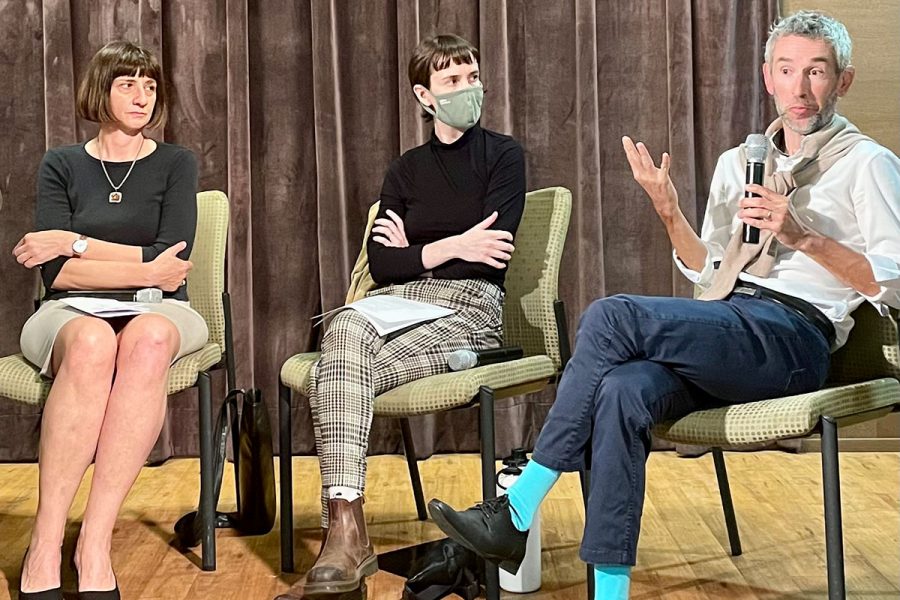
A Florida State University interdisciplinary panel of experts on Tuesday shared a historical and present-day context of Russia’s invasion of Ukraine and urged attendees to think critically and cautiously about the information they’re consuming on television and social media about the crisis.
The FSU Center for Global Engagement’s “Understanding the War in Ukraine” featured eight experts across a broad range of FSU disciplines and departments: Strozier Library, International Affairs, the School of Communication, the Department of History and the Department of Modern Languages and Linguistics.
In a 90-minute “teach-in” at the Global and Multicultural Engagement Building, or The Globe, panelists delved deep into history – with references to the Bolshevik Revolution, Catherine the Great and even the 5th millennium BCE – and emphasized historical boundaries and linguistic differences that they said established Russians and Ukrainians as distinct people who speak distinct languages.
“Ukrainian is not a dialect of Russian, and likewise Russian is not a dialect of Ukrainian,” said Robert Romanchuk, FSU’s Pribic Family Associate Professor of Slavic. “No historical dialect continuum indeed exists between the two languages.”
Said Michael Launer, professor emeritus of Russian: “I think it’s important historically to realize that Russian developed out of Ukrainian and not the other way around – which is the way most people think.”
In the months and years leading up to the February invasion, Russian President Vladimir Putin asserted that Russians and Ukrainians constitute one nation or “one people.”
Svitlana Jaroszynski, a visiting instructor in the School of Communication, pointed out examples of how Ukrainian society incorporates the Russian language. She said television guests and experts frequently speak Russian and Ukrainians often see films with Russian subtitles.
“So any claim that Russian is threatened in any shape or form in Ukraine, I think is not substantiated,” she said.
Jaroszynski grew up in Crimea, which Russia annexed from Ukraine in 2014. She attended college in the Ukrainian region of Donbas and lived for more than 10 years in Western Ukraine.
Tuesday’s discussion also included NATO expansion since the 1989 collapse of the Soviet Union, to which Ukraine belonged. Putin maintains that Russia never will accept an inclusion of Ukraine in NATO.
Ukraine and other countries that existed in the Soviet Union or under Soviet influence “no longer want to be part of Russia’s empire, and they have been willing to do whatever it takes, including military resistance in Ukraine’s case, to guarantee this,” said Lee Metcalf, director of FSU’s international affairs program. “Rather than scaling back its aims in response to this resistance, Russia has doubled down.”
Na’ama Nagar, a teaching faculty member in FSU’s international affairs program and Political Science Department, implored residents of Tallahassee and elsewhere to support refugees – Syrians, Afghans, Ukrainians and others – and to donate to organizations such as the International Rescue Committee.
Liz Dunne, the instruction and reference librarian at FSU Libraries, cautioned social media users about a rush of false information, including from Russian state media and pro-Russian groups.
“The algorithms driving these platforms are weighted heavily for quantity, for popularity, for relevance,” she said. “They’re not necessarily weighted for quality and information accuracy.”
Patrick Merle, associate professor and director of FSU’s School of Communication, emphasized the problem of punditry over journalism in U.S. cable news and suggested that viewers “really understand that the sources that you need to seek are sources that are based on facts” – especially from reporters at the site of the conflict.
The experts fielded a variety of questions from people who attended in person or via livestream. Attendees wanted to know, for example, what happens if Russia succeeds, what happens if Ukraine succeeds and whether the world has embarked on a new era in international relations.
“At deepest historical level, the current war in Ukraine flows from Russia’s experiences as an empire rather than as a nation state,” Jonathan Grant, an FSU professor of modern Russian history, said in his opening remarks. “Consequently, Russia has had difficulties with nationalism of any sort as a threat to imperial integrity.”




